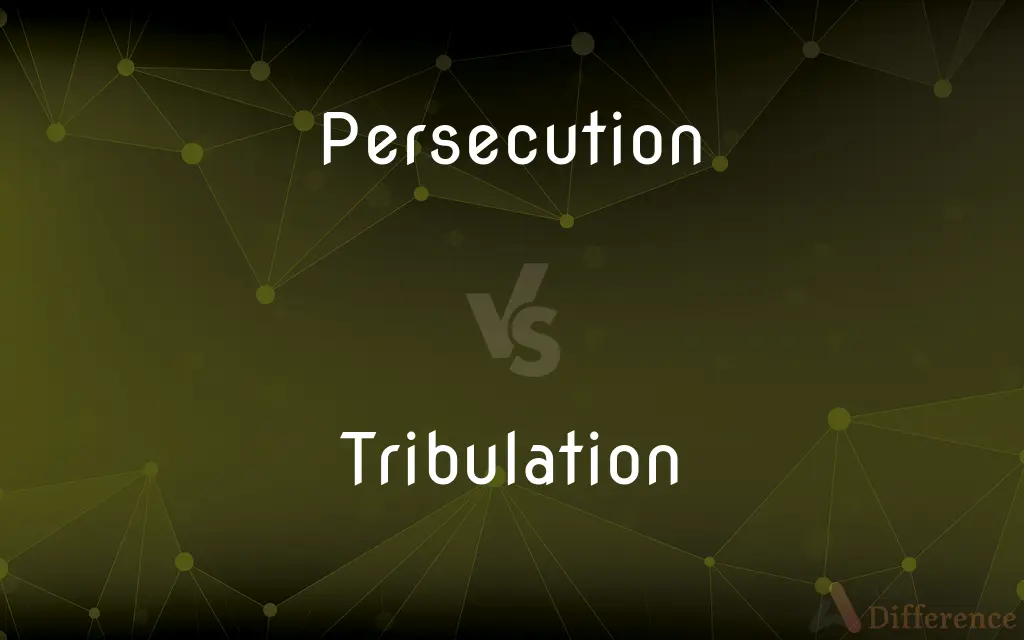Persecution vs. Tribulation — What's the Difference?
By Maham Liaqat & Fiza Rafique — Updated on April 4, 2024
Persecution involves targeted hostility towards a group, while tribulation refers to general suffering or hardship.

Difference Between Persecution and Tribulation
Table of Contents
ADVERTISEMENT
Key Differences
Persecution is the act of subjecting a specific group or individual to hostile treatment, often due to their beliefs or identity. This can include actions such as harassment, punishment, and violence, aimed at suppressing or eliminating their presence or practices. Whereas, tribulation encompasses a broader range of difficulties or sufferings that can affect anyone, regardless of their identity or beliefs. It's not necessarily targeted and can result from various factors like natural disasters, personal loss, or societal issues.
While persecution directly involves an oppressor who actively causes suffering to a particular group or individual, tribulation can be the result of impersonal forces or circumstances. For instance, economic downturns, health epidemics, and natural disasters are types of tribulations that impact wide swaths of the population without discrimination. On the other hand, tribulation can also serve as a backdrop for persecution. For example, during times of widespread hardship, minority groups often face increased persecution as they become scapegoats for societal frustrations, showing how tribulation can indirectly lead to or exacerbate persecution.
Persecution usually has a clear motive behind it, such as religious intolerance, political opposition, or racial discrimination. These motives drive the actions of persecutors, making their behavior more deliberate and targeted. In contrast, tribulation lacks a personal motive and does not stem from a desire to inflict pain or suffering on specific individuals or groups.
The response to persecution often involves seeking justice or relief through legal systems, international aid, or social advocacy, focusing on stopping the oppressors and protecting the victims. Responses to tribulation, however, tend to revolve around coping strategies, support systems, and rehabilitation efforts aimed at overcoming or enduring the hardships.
Comparison Chart
Definition
Targeted hostility towards specific groups or individuals.
General suffering or hardship affecting anyone.
ADVERTISEMENT
Cause
Beliefs, identity, or practices of the victim.
Natural disasters, societal issues, personal loss.
Motivation
Intolerance, discrimination, or suppression.
Impersonal circumstances or forces.
Discrimination
Yes, based on specific attributes.
No, indiscriminate.
Response
Legal aid, advocacy, protection measures.
Coping strategies, support systems, rehabilitation.
Compare with Definitions
Persecution
Suffering inflicted because of identity.
Historical records detail the persecution of witches in early modern Europe.
Tribulation
Challenges that test faith or belief.
In many religions, enduring tribulation is seen as a test of faith.
Persecution
Intense hostility towards a group.
The persecution of religious minorities often includes both social ostracism and legal restrictions.
Tribulation
A period of great trouble.
The novel explores the protagonist's journey through personal tribulation and redemption.
Persecution
Actions aimed at marginalizing individuals.
Legal persecution is used to intimidate activists and suppress dissent.
Tribulation
Difficult experiences testing resilience.
Tribulation often brings out unexpected strengths in individuals.
Persecution
Systematic mistreatment based on beliefs.
Political dissidents faced persecution under the authoritarian regime.
Tribulation
Severe trials or suffering.
The community rallied together during times of tribulation following the natural disaster.
Persecution
Harassment with the intent to oppress.
The artist endured persecution for his controversial works.
Tribulation
General hardships encountered in life.
Financial tribulation has become a common theme in modern society.
Persecution
Persecution is the systematic mistreatment of an individual or group by another individual or group. The most common forms are religious persecution, racism and political persecution, though there is naturally some overlap between these terms.
Tribulation
Great affliction, trial, or distress; suffering
A time of great tribulation.
Persecution
The condition of being persecuted.
Tribulation
An experience that tests one's endurance, patience, or faith.
Persecution
The act of persecuting.
Tribulation
Any adversity; a trying period or event.
Persecution
The state or condition of being persecuted.
Tribulation
That which occasions distress, trouble, or vexation; severe affliction.
When tribulation or persecution ariseth because of the word, by and by he is offended.
In the world ye shall have tribulation.
Persecution
A carrying on; prosecution.
Tribulation
An annoying or frustrating or catastrophic event;
His mother-in-law's visits were a great trial for him
Life is full of tribulations
A visitation of the plague
Persecution
The act of persecuting (especially on the basis of race or religion)
Common Curiosities
Can tribulation lead to persecution?
Yes, tribulation can exacerbate societal tensions, potentially leading to increased persecution of vulnerable groups.
Is persecution always deliberate?
Yes, persecution involves deliberate actions aimed at oppressing or harming specific groups.
Can persecution be legal?
Unfortunately, persecution can be institutionalized and sanctioned through laws and government actions.
What are common sources of tribulation?
Common sources include natural disasters, economic crises, and personal losses.
How do individuals respond to persecution?
Individuals often seek justice, legal protection, or international support in response to persecution.
What role does faith play in enduring tribulation?
For many, faith offers comfort and resilience during times of tribulation.
What causes persecution?
Persecution is caused by hostility towards a group's beliefs, identity, or practices.
Can anyone experience tribulation?
Yes, tribulation is indiscriminate and can affect anyone, regardless of their identity or beliefs.
How do societies address persecution?
Societies address persecution through legal remedies, social advocacy, and protective measures for victims.
What differentiates persecution from discrimination?
Persecution is a severe form of discrimination with the intent to oppress; discrimination can be broader and less intense.
Does tribulation have any positive outcomes?
Tribulation can lead to personal growth, strengthened communities, and a greater appreciation for life.
How can individuals help those facing persecution?
Individuals can offer support through advocacy, donations, and raising awareness about the issues.
Can tribulation affect mental health?
Yes, enduring tribulation can significantly impact an individual's mental health, necessitating support and resilience strategies.
Is tribulation always caused by external factors?
While often caused by external factors, personal choices and behaviors can also lead to tribulation.
How do international communities respond to persecution?
International communities may impose sanctions, provide asylum, and offer aid to victims of persecution.
Share Your Discovery

Previous Comparison
Serial vs. Drama
Next Comparison
Doughnut vs. FritterAuthor Spotlight
Written by
Maham LiaqatCo-written by
Fiza RafiqueFiza Rafique is a skilled content writer at AskDifference.com, where she meticulously refines and enhances written pieces. Drawing from her vast editorial expertise, Fiza ensures clarity, accuracy, and precision in every article. Passionate about language, she continually seeks to elevate the quality of content for readers worldwide.














































